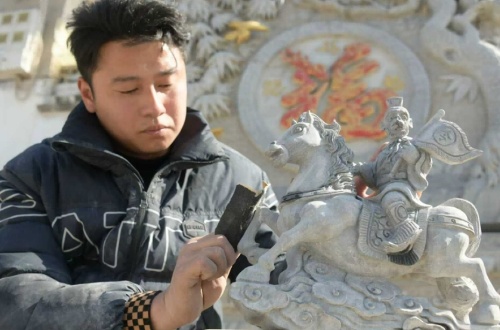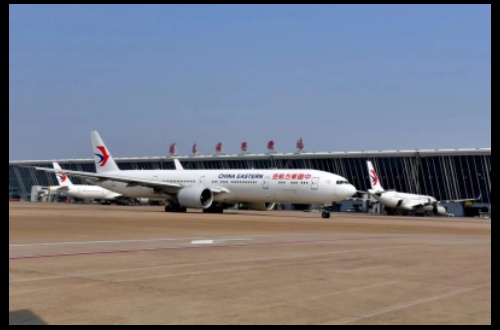Newest
-

Changsha’s Tianxin District Celebrates Lantern Festival with Four-City Historic Tower Light Linkage
-

Xun County, C China's Henan: Young Artisans in "Hometown of Stone Carving" Bring Millennium-Old Craft to Life
-

Inside MWC 2026: See How China Mobile Leads the Tech Innovation Wave
-

China Eastern Airlines Announces Comprehensive Upgrade to International Route Network in 2026
How XTransfer helps smaller B2B exporters access cross-border financial services?
 2020-11-10
2020-11-10
By Liu Yusong, November 9, 2020 (Shanghai) -- With a spike in cross-border trade activity, small and medium-sized business-to-business (B2B) exporters need to find a way to address the difficulty in collecting foreign trade payment, Bill Deng said at the recently closed Guangzhou Foreign Trade Finance Summit.
In an interview with China Trade News, the founder and chief executive of China's leading cross-border risk management and financial services provider XTransfer, said as global regulators step up their scrutiny of risks in relation to money laundering and frauds, financial institutions will have to monitor money flows through client accounts more closely.
China has emerged as the world's largest exporter. "For every 100 yuan in global exports, about 17 yuan's worth is contributed by China," said Deng.
He added over the past 20 years, global trade has become increasingly fragmented, with millions of SMEs and micro firms accounting for 60 percent of China's exports. That proportion keeps growing.
Somehow the financial infrastructure needed for expanding foreign trade has not grown in tandem, sparking concerns among firms that they might be kicked out of their accounts.
Zhou Lingbo is among those worried business owners. The director of Kuda Motorcycle Parts Trade Co. Ltd, told the reporter that it's hard to assess if wired customer payments are risk-free. If so, banks will proceed to freeze client accounts to investigate. "Banks occasionally would notify you of their action, but more often than not, you only realize that you are in trouble after the account is frozen," said Zhou.
Zhou is not alone in experiencing this plight. In accordance with global anti-money laundering requirements, exporters need to ensure that received payments are legitimate on their own.
"This is like asking the shopkeeper to decide if the money with which customers buy stuffs is legally acquired," said Deng of XTransfer. In his opinion, despite China's smaller B2B exporters now totaling between 4 and 5 million, they are mostly underserved by traditional financial institutions like banks.
According to industry insiders, the major compliance risks confronting global banks in processing cross-border trade payment are related to violating sanctions and laundering money.
Banks usually take the former risk more seriously, due to dreadful consequences thereof and clear-cut regulatory rules in this field. But they typically are less inclined or slow to vet large-sum, suspicious transactions. Nor do they take the initiative to develop a model capable of completing this task. Most often, banks' regulatory focus is on the movement of money within national borders.
"What's more, since SME exporters themselves lack the ability to screen risks, they find it hard to conduct autonomous tests designed to head off money laundering risks," said Deng.
But as a key component of anti-money laundering (AML), screening cross-border trade for risks is of utmost importance to a country's social, economic and financial security.
As such, the vigilance of compliance personnel and their understanding of the nature of products and services are necessary to effective risk evaluation in the case of trade deals. Money launders have multiple ways to deceive financial institutions or even pressure banks with urgent "11th-hour" requests, causing the latter to make ill-informed decisions without conducting sufficient investigation.
Therefore, establishing a model that combats money laundering in trade and choosing proper risk criteria and due diligence tools are as critical as staff training to the identification, assessment and prevention of money laundering.
To this end, Deng and his team are pulling out all stops over the past few years to work on a relatively sound system aimed at providing B2B cross-border financial and risk management services. The goal is to assist SMEs and micro businesses in mitigation of AML risks to the largest extent possible.
"XTransfer's solution is to build a data-driven, automated, internet-enabled and intelligent risk management system as well as a globally unified financial network," said Deng. "We offer cross-border financial services ranging from opening a global and local account for payment collection to foreign currency exchange and declaration of income in countries with non-convertible currencies."
XTransfer became a strategic partner of the China Council for the Promotion of International Trade Center in August 2019, two years after the startup was founded. They decided to team up in serving domestic SMEs. XTransfer also participated in the China International Import Expo in the same year. To date, it has provided cross-border financial and risk management services to upwards of 70,000 SME exporters. In Guangzhou alone, it counts over 10,000 businesses among its clients. In a further indication that it has secured more recognition, XTransfer also became a council member of Guangdong Cross-Border E-Commerce Association this year.
That said, some foreign trade professionals still harbor misgivings about this novelty. Zhou, director of the aforementioned motorcycle parts trading firm, is one of the skeptics. "Although I used XTransfer a few times to collect payment, the sums were not big," he said, crediting XTransfer for the ease of registration on its platform and the smaller transaction fees it charges relative to banks. "But is fund safety really guaranteed? Does the platform's operation involve risks of irregularity?"
In response, Deng of XTransfer said these user concerns are phases of growth which the company cannot avoid. At the moment, he said restrictions on money flows beyond borders are a pain point confronting numerous smaller B2B players engaged in international trade. "Based on our AML capabilities, our professionalism and delivery of customer value are what it takes to win trust," Deng claimed.
According to him, XTransfer has secured licenses and certificates from Hong Kong authorities as a Money Service Operator, from British authorities as an Authorized Payment Institution. It also has completed filings with regulators such as FINCEN (US), FINTRAC (Canada) and AUSTRAC (Australia).
Aside from making Shanghai its headquarters, XTransfer has branches in major trade cities like Hong Kong and Shenzhen, as well as in regions including North America, Europe, Oceania and Southeast Asia.
"We are progressing over time and have won more and more trust and support from customers through our professionalism and diligence," Deng noted.
Industry peers have pinned high hopes on collaboration with XTransfer. At the Guangzhou forum, Chen Jinsong, head of Beijing Ibex International Exhibit Co. Ltd, told China Trade News that the company is mulling ways to include XTransfer's services in its business, so as to help more exhibitors expand globally and achieve a win-win outcome.
Company Name: XTransfer
Contact Person: Kefei Wei
Email: kefei.wei@xtransfer.cn
Country: China
City: Shanghai
Website: https://www.xtransfer.cn/
